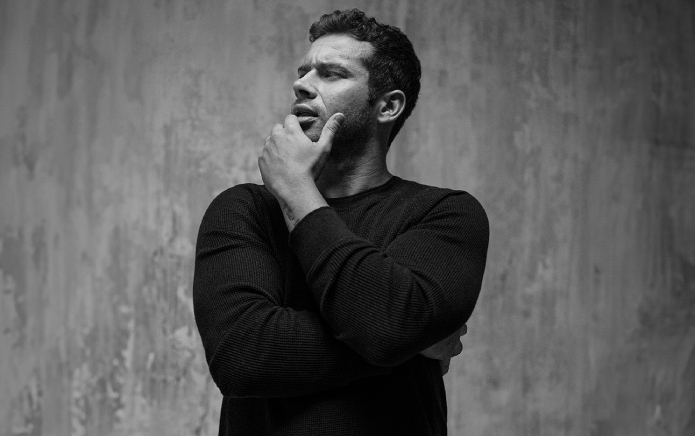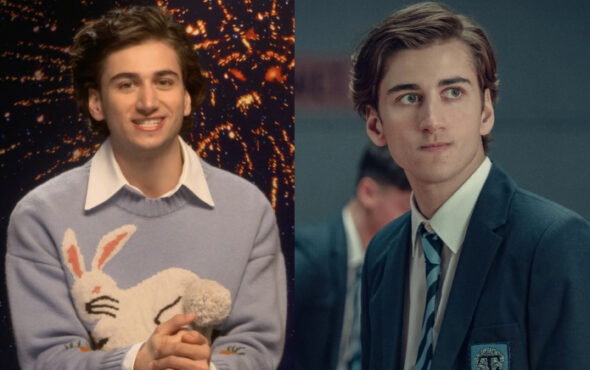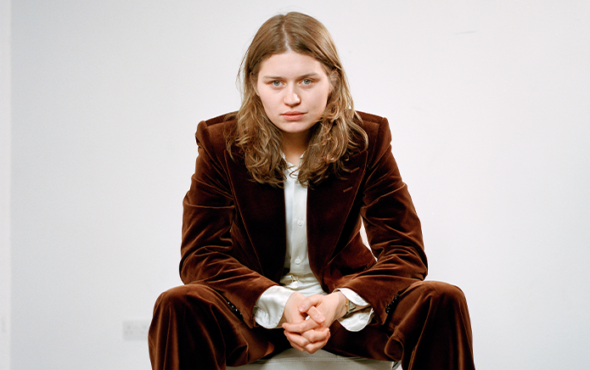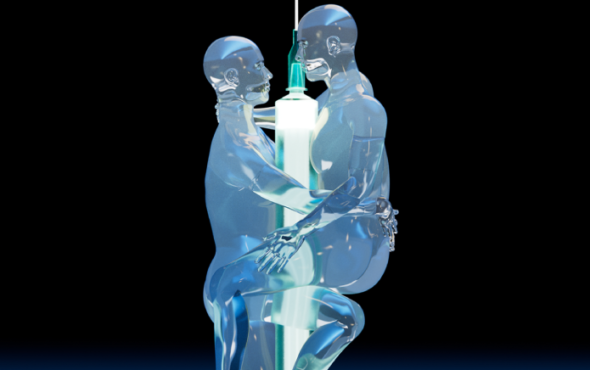
“That’s good, be uncomfortable!” Brandon Kyle Goodman tells the conservative cis-het viewers and critics who have deemed Netflix’s animated favourite Big Mouth as too “crass” or “vulgar” for its unflinching depiction of LGBTQ+ narratives. “I’ve definitely seen the critiques where people are like, ‘It’s so gay, everyone’s gay, everyone’s queer.’ It’s like… yeah?” the self-described ‘actor, writer, activist and messy mom’ tells GAY TIMES over Zoom. “That’s real life too, baby.”
Following various film and TV appearances such as Prime Video’s Modern Love and Netflix’s Feel the Beat, the American comedian landed his breakthrough role in 2021 as a writer and voice actor on the fifth season of the streamer’s groundbreaking comedy, as well its spin-off Human Resources, which launched in March. Since its 2017 premiere, Big Mouth has been met with rave reviews for its portrayal of sex, the human body and the joyful, nuanced representation of LGBTQ+ characters and stories.
Living at the intersection of Black and non-binary, Brandon (who uses he/they pronouns) is determined to use his platform to represent marginalised voices in a world that doesn’t ‘love, value or protect’ them – one joke at a time. “I think we’re all better from diversity, and I think there’s such a fear around diversity and inclusivity, but we are better for understanding people’s experiences and other people’s humanities,” they explain. “I hope that becomes a value that Hollywood latches onto at some point. I think we’re beginning to, but we have a lot of work to do.”
With a sixth season of Big Mouth arriving this year, as well as a self-help book/memoir and two more television shows – “[Netflix] paying these bills mama, and I’m not mad!” he adds – we caught up with Brandon to discuss the aforementioned topics, their career so far and the rising queerification in animation.
Congratulations on the success of Human Resources. How have you found the reception to the series so far?
It’s been wonderful. It’s one of those things where, with animation, our show takes a year-and-a-half to make, so we’re already working on Big Mouth’s next season. It was weird to have it come out, but also really gratifying to hear all the messages and to hear that the Walter storyline with Yara has really been resonating with a lot of people. It’s been really beautiful.
It feels like we’re kind of ushering in a new era of television where animation, specifically, is flying the flag for the LGBTQ+ community. How much power do you think animation has on viewers at home, especially young queer viewers?
It has a ton. I think, in some ways, it’s underrated. There’s a reason that The Simpsons still exists. There’s a reason that some of these shows, Bob’s Burgers and Family Guy, have been on for so long because there is something that connects them to younger and older viewers. It does have power. I’m really excited that our show recognises that and understands that and uses it to expand what representation looks like. A lot of times in live-action, the excuses you get are that people won’t relate or we can’t find that person or we can’t find whatever. Animation, you can draw it. What do you mean? You can draw it. So, I think it has become this space where we can expand and have a little more fun. I also think comedy in general has been that. As an actor, I have often found that it was hard to find my place in drama and theatre because everything was very white and cis and het. It was actually in the world of improv and sketch and comedy where I was able to find some semblance of rooting and home. It makes sense that these animated comedies are where that expansion is happening.


Do you think animation is now more inclusive than other spaces?
I think it’s shifting. I remember in 2020 we were having a big reckoning about all these diverse characters and how they were voiced by white people. So, I don’t think it’s been the most inclusive, but I think it’s shifted and probably shifted quicker than some other spaces and some other shows. But I think it’s part of the larger conversation. How do we do better about being inclusive, representing and casting correctly? And not just casting, but also behind the scenes. Who are the writers? Who are the producers? How do we expand that? I think it’s why, with Big Mouth, I’m so proud to be part of the show. We’ve had our hiccups, but we didn’t shy away from it. My bosses jumped right into it and made the appropriate adjustments, which is all you can ever ask people. Acknowledge whatever hiccups there are, move forward and do better.
Living at the intersection of Black and non-binary, is it important for you to bring your personal experiences to the Big Mouth and Human Resources universe?
Yes, certainly. I think that, when the upcoming seasons come out, you’ll see even more of that. In the episodes that I’ve written, there’s a lot of my POV energy, such as Missy and her cousins in the Thanksgiving episode, or Matthew not wanting to give a handjob to Aiden. We all bring our POV to it. I, especially, have a connection to the characters that are closer to my experience, where it’s Matthew being queer and Missy being Black. I definitely feel more protective of them and their stories and how those stories get shaped.
While Big Mouth has received widespread acclaim, it has been criticised, by some, for being too “crass” and “vulgar”. Do you think that’s because of the LGBTQ+ representation?
I’ve definitely seen the critiques where people are like, ‘It’s so gay, everyone’s gay, everyone’s queer.’ It’s like… yeah? That’s real life too, baby. I think in general, the show gets that rap. I was with a friend last night and he was like, ‘Humans are dirty,’ and we are. We hide it in our Puritan culture, in our perfectionism. But, when we’re with our friends and we’re not watched, we’re just as dirty and crass. It makes people uncomfortable and that’s good, be uncomfortable! I think the reason why we are so successful is because there’s stories being told with care and emotion.
I recently wrote a piece on the second season of Bridgerton, questioning why the series has failed to include substantial LGBTQ+ representation. Reaction was mixed, with some saying it’s not necessary for all shows to include queer characters. Where do you stand on that?
I feel this with queerness and Blackness. I always use Succession as an example because it’s so fucking white and I love it. It makes sense to me because that is that world. Of course it is. Then, where there are people of colour, it’s at a super fancy white dinner and the stand-up comedian is Black. I know that situation. I’ve seen that and I’ve actually been in that space. So, that makes sense to me why that show is that. But, there are other shows where it’s five friends in New York City and everyone’s white and straight. That is trash. So, it depends on the context. When people default to cis-het white, especially in a big city like LA or NYC, that’s weird. Why? Especially in 2022, why? It’s lazy, because people are obviously writing what they know. It also speaks to what’s being greenlit, who’s greenlighting it, who the producers are and the lack of representation in those spaces. It’s about who’s in those offices and how it’s so staunchly white and straight. I think we’re all better from diversity, and I think there’s such a fear around diversity and inclusivity, but we are better for understanding people’s experiences and other people’s humanities. I hope that becomes a value that Hollywood latches onto at some point. I think we’re beginning to, but we have a lot of work to do.

Later this year, you will release your first book, You Gotta Be You. From the title, it sounds like it will be self-help, so what can we expect from that?
It’s part self-help, part memoir, a guidebook to self-love, essentially. I always say self-love sounds cliché, but it is literally what saved my life as a queer person – as a queer Black person. In a world that doesn’t love you, value you or protect you, you’ve got to love, value and protect yourself. It’s about transformative moments in my life that are either to do with race, gender and sexuality and their intersections, and me reexamining them and the lessons to take away from them; whether it’s the first time I got followed in a store, the first person I fell in love with or being estranged from my mother. What are these moments that happened that were transformative and created who I am today? How do I undo whatever wasn’t necessary? I was always told that my nose was too big, and that was a truth I took on. There was a period of time where I was thinking about getting plastic surgery, but that was rooted in other people telling me that something was wrong with me. My nose is fabulous, is what I discovered. We carry this bullshit as truth and we never take the chance to reexamine and say, ‘Okay, what about this is true?’ Is my femininity bad? No, it’s not. So, that’s what the book is like.
There’s a lot to congratulate you on, because your Instagram series Messy Mondays has been picked up by Netflix, so huge congratulations!
Yes! They’re doing a mini game show version of it, inspired. It’s not Messy Mondays exactly, but it’s inspired by what I do on Instagram, which is really exciting. We just shot two episodes, so we’ll see how that goes. Yeah, I’m excited to continue with Netflix. They’re paying these bills mama, and I’m not mad!
Not only that, but you’re developing a show around mental health too, right? What can you tell me about that?
I’m developing a show that is based off of my life, the mental health of a queer Black person. This character identifies as a man, so the mental health of a Black man, but more-so what it’s like to experience being Black and queer in modern day America and finding your identity. It’s a coming-of-age comedy following a Black man who is looking for his father, and in that search, tries to find himself. I’m not allowed to say much more than that!
Throughout your career, you’ve worked in animation, live-action, theatre, podcasts and more, but – and this might be a tricky question – what fulfils you the most?
Live theatre, which is what I was saying to my husband. I haven’t been on stage in like, two-and-a-half years, and I feel like my equilibrium is off! Not like a traditional play, but where I get to interact with the audience. I’m not a stand-up, I would never claim to be, but I’m a comedian and I do solo shows and play characters. It’s very audience-interactive, and I miss that. The immediate reward of hearing your audience laugh and the magic of being in the same space is unmatched to me.
Big Mouth is now streaming on Netflix.



